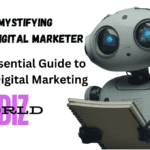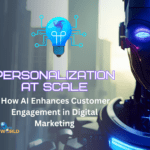“How AI Enhances Customer Engagement in Digital Marketing”
In today’s fast-paced digital world, effective customer engagement is essential for businesses to thrive. With the advancements in AI-powered technology, companies can now leverage artificial intelligence to enhance customer engagement through AI personalization at scale. By combining AI-generated creative content with AI-enabled decision-making, businesses can deliver tailored and meaningful experiences to their customers, resulting in improved engagement, increased conversions, and ultimately, business growth.
Table of Contents
- 1. Personalized Customer Experiences
- 2. The Power of AI in Content Personalization
- 3. Leveraging AI for Customer Engagement
- 4. Real-World Success Stories
- 5. Overcoming Challenges in Implementing Personalization at Scale
- 6. The Future of AI in Digital Marketing
- 7. Conclusion
- FAQs (Frequently Asked Questions)
1. Personalized Customer Experiences
In the era of digital marketing, personalized customer experiences have become a key differentiator for businesses. Customers expect tailored content and relevant interactions that resonate with their needs and preferences. This is where AI comes into play, revolutionizing content personalization and customer engagement.
2. The Power of AI in Content Personalization
AI-powered technology has opened up new possibilities for businesses to deliver personalized content at scale. By analyzing vast amounts of customer data, AI algorithms can identify patterns, preferences, and behaviors, enabling businesses to create targeted and relevant content. AI creative content generation automates the selection of resonating words and phrases, leading to increased conversion rates.
3. Leveraging AI for Customer Engagement
To enhance customer engagement, businesses can leverage AI in various ways:
AI-driven Customer Insights
AI algorithms can analyze customer data to gain valuable insights into their preferences, behaviors, and buying patterns. This information can be used to create AI personalization marketing campaigns and tailor communication strategies to individual customers.
Dynamic Content Generation
AI-powered systems can generate dynamic content based on customer data, such as personalized product recommendations, relevant offers, and targeted messages. This level of personalization increases customer engagement and drives conversions.
Automated Customer Service
AI chatbots and virtual assistants can provide instant and personalized customer support, addressing common queries and issues. This automation improves customer experience and frees up human resources to focus on more complex tasks.
For more on this topic Read Here
4. Real-World Success Stories
Numerous businesses have already experienced significant success by embracing AI for content personalization and customer engagement. Here are a few examples:
Mobile Telco Campaign
A mobile telecommunications company implemented a personalized marketing campaign using AI-generated content. The campaign resulted in a 36% increase in customer engagement and an impressive 83% increase in conversions.
Bank and Airline Personalization
A bank and an airline leveraged AI algorithms to create personalized messaging for different customer segments. This approach led to a 29% to 61% reduction in cost per acquisition, demonstrating the cost-saving potential of AI-driven personalization.
5. Overcoming Challenges in Implementing Personalization at Scale
Implementing personalization at scale can come with its own set of challenges. Here are some key considerations for businesses:
Handling Massive Data
Personalization relies on analyzing large-scale customer data. Businesses need robust data management systems and infrastructure to collect, store, and process this data effectively.
Utilizing Appropriate Triggers
Identifying the right triggers for personalization is crucial. Businesses need to understand the customer journey and leverage AI algorithms to identify the most appropriate moments to deliver personalized content and experiences.
Fostering Cross-Functional Collaboration
Successful personalization at scale requires collaboration across different departments, such as marketing, sales, and IT. Businesses should foster a culture of collaboration and establish cross-functional teams to ensure seamless implementation.
Utilizing the Right Technology Tools
Choosing the right technology tools and platforms is essential for effective personalization. Businesses should invest in AI-driven customer decision platforms and other relevant technologies to enable data integration, customer-driven decision-making, and coordinated content distribution.
https://obizworld.com/ai-in-digital-marketing-complete-guide
6. The Future of AI in Digital Marketing
As AI continues to evolve, its role in digital marketing will only become more significant. The future holds exciting possibilities for businesses, such as:
- Advanced predictive analytics to anticipate customer needs and deliver proactive, personalized experiences.
- Enhanced natural language processing capabilities for more human-like interactions with AI-powered chatbots and virtual assistants.
- Integration of AI with other emerging technologies, such as augmented reality (AR) and virtual reality (VR), to create immersive and personalized experiences.
“How AI Enhances Customer Engagement in Digital Marketing”
7. Conclusion
AI has revolutionized content personalization and customer engagement in digital marketing. By leveraging AI-powered technology, businesses can deliver personalized experiences at scale, leading to improved customer engagement, increased conversions, and business growth. To stay competitive in the digital landscape, businesses must embrace AI-driven personalization strategies and continuously adapt to evolving customer expectations.
FAQs (Frequently Asked Questions)
- Q: How does AI enhance customer engagement in digital marketing?
- A: AI enhances customer engagement by analyzing vast amounts of data to gain insights, generating dynamic content, and providing automated customer service.
- Q: What are some real-world examples of AI-driven personalization success?
- A: Companies across industries, such as telecommunications, banking, and airlines, have experienced significant success through AI-driven personalization, resulting in increased engagement and conversions.
- Q: What challenges are associated with implementing personalization at scale?
- A: Challenges include handling massive data, identifying appropriate triggers, fostering cross-functional collaboration, and utilizing the right technology tools.
- Q: What is the future of AI in digital marketing?
- A: The future holds advanced predictive analytics, enhanced natural language processing, and integration with emerging technologies like AR and VR.
- Q: How can businesses stay competitive in the digital landscape?
- A: By embracing AI-driven personalization strategies and continuously adapting to evolving customer expectations.





Attractive section of content I just stumbled upon your blog and in accession capital to assert that I get actually enjoyed account your blog posts Anyway I will be subscribing to your augment and even I achievement you access consistently fast
[…] For More about this topic Read this also […]
Hi Neat post There is a problem along with your website in internet explorer would test this IE still is the market chief and a good section of other folks will pass over your magnificent writing due to this problem
I was recommended this website by my cousin I am not sure whether this post is written by him as nobody else know such detailed about my trouble You are amazing Thanks
Hi i think that i saw you visited my web site thus i came to Return the favore I am attempting to find things to improve my web siteI suppose its ok to use some of your ideas